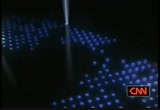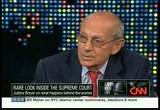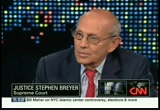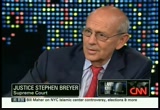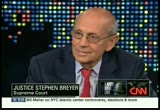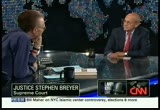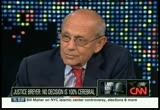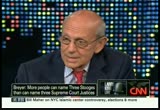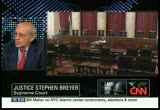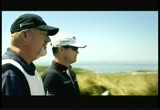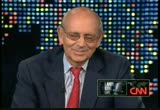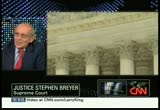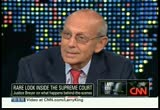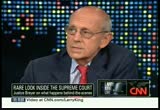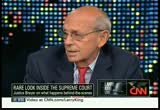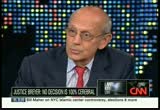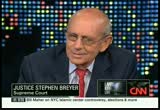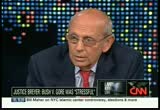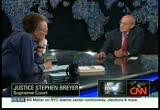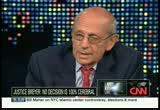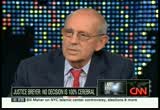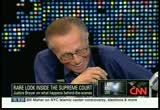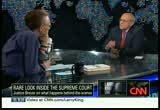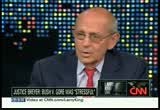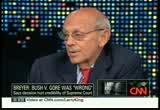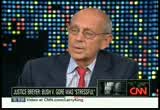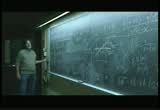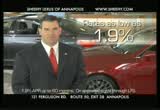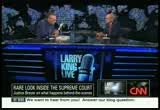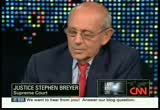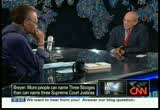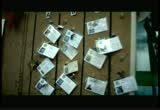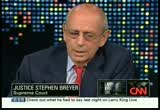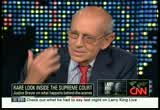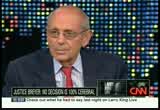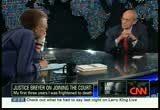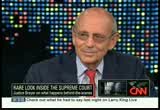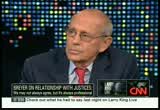tv Larry King Live CNN September 15, 2010 9:00pm-10:00pm EDT
9:00 pm
one more time. all net. we give a book out every night. here's the one we chose tonight. the person who wins -- you ready -- a copy of the book goes to xyz chilled out, he writes the following, okay, rick, bolviate is a word. do i get a book? would love to have one signed. yes, you do. it's on the way. it's on the way. here now, larry king. -- captions by vitac -- www.vitac.com >> larry: tonight, supreme court justip justice stephjustics us behinp us behind tus b closr closclosed doorwr
9:01 pm
landmap landmark calandmar presidential election. >> larry: tonight, supreme court justip justice stephjustics us behinp us behind tus b closr closclosed doorw ar and wp wrong on bush. next on "larry king live." good evening. justijustice stephen breye. returns to "larry king live." author of the new book make our democracy work, a judge's view. it's been just about six years. thanks for -- about six years between book right? >> yes, that's right. >> what does the title imply your honor that democracy is not working? >> you've talking about the court's point of view. and i want to explain to people what the court is and what it does and why it might be important to them. i think it helps when it's working correctly. the democracy works better. >> larry: wouldn't any person who took civics know how a supreme court works? >> that's right.
9:02 pm
and justice o'connor and justice souter and a lot of the other members of court. few and few seem to be taking what we had, civics. and that's a problem. >> larry: why aren't they teaching it? >> you have to ask. we ask all the time and say please, please. and that isn't from our personal point of view. that's from the point of view that we work with the document, the constitution, that's part of my life, and you just read that and work with it and you see it presupposes that the public, the average citizen, the person who will decide what this country is like, the person where the power lies, the sorurce of our laws that that person will know something about the government. >> larry: would you caught three part system under which we rshg the courts and the legislature, a genius concept? >> it was a brilliant concept. it came it's off the french
9:03 pm
enlightenment. it came out of the scottish enlightenment. and somehow those words written down on paper have produced a nation that's worked pretty well. it's had its ups and downs. lots of them. but it's worked pretty well for 200 years. i think that's -- genius is fair. >> larry: the average person may not -- why is it important that federal judges supreme court not be elected, that the public not have a choice in that except through the elected representatives approving them? >> it's a good question. hamilton asked himself that question. here's was his reasoning. the reasoning is this. he said, you know, we've written this document -- all right, here it is, you know, that's it. >> larry: that's the whole constitution? >> that's it, very brief. and he says to himself, should there be somebody in this government whose job is it to enforce these provisions when the others won't follow them? he said yes, we better have
9:04 pm
somebody, because otherwise this will just become a piece of paper. put it on the wall. work of art. but it won't be a document that governs. who should that be? well, he said, not the president. the president will become too powerful. not the congress because you've got to enforce it when it's unpopular. i mean, congress should do it if it was always unpopular to enforce the constitution. but when it's unpopular. he said, congress isn't going -- they just passed a law that's popular. why would they then turn and and set it aside? so, he said, that leaves the judges, that leaves the judges. bureaucratic group. they don't have the purse. they don't have the sword. they're not very powerful. and it's safe to give them that power. he didn't ask one question. he didn't ask this question. if these people are so powerless, no purse, no sword,
9:05 pm
if they're going to decide unpopular things when it counts -- >> larry: who's going to obey them? >> good point. that's quote he asked. that's shakespeare. that's hot spurs question. you know hotspurs question. >> larry: no. >> he says, i can summon spirits from the vastly deep. he's kind of mystic, welchman. he said, i can summon spirits from the vastly deep. so hotspur turns to him and says, so can i. he says, so can any man. but will they come when you do call them? and that is 200 years of our history. because if you go back to the early times, john marshal said the cherokee indians own northern georgia. it's theres. andrew jackson, president, said john marshal made his decision, let him enforce it. and he sent troops to northern georgia to enforce the court's decision. not on your life. to evict the indians. they went along the trail of
9:06 pm
tears to oklahoma. and many died. few survived. so it's a long time -- it's a long, long history before americans, americans thought, you know, maybe it's better that we follow unpopular decisions, even if they're wrong, if we don't like them, then kill each other in the streets, and that's important, and that's why they ought to know what it's about. >> larry: as a justice, is it difficult at times to rule with your head against your heart? >> yes. simple answer is yes. but no decision -- you make decisions. and no decision is 100% cerebral. decisions are combinations of thoughts which are important and values which are not exactly purely cerebral. and understandings which are internalized, cerebral. what's the country like?
9:07 pm
what's the value of free speech like today? what does it mean, free religion? what does it mean, liberty that word in the 14th amendment? there is no computer so brilliant from which we can die dues t deduce the meaning of those worlds. >> larry: you ought to be on the court. does it bother you that a poll said two-thirds of those questioned couldn't name one supreme court justice? >> i was asked this question the other day. i've been asked it several times. >> larry: does it bother you? >> no. i say this. here's why. my point is -- what used to be -- about four or five years ago, we had this other, people would say, we discovered, because it was some poll then, that more people can name the three stooges than can name three supreme court justices. so i say that's fine, if they don't know my name. what isn't fine, what isn't fine at all, is they can't name the three branchs of government.
9:08 pm
if they can't name the legislature, congress, the president, the executive, the courts, the judiciary, then we're in trouble. >> larry: that's tragic. >> yes. >> larry: i bet a lot couldn't. >> it's possible. but, you know -- >> larry: i've got one solution which bugs many americans, in fact. we've gotten a number of questions via our social media group here. blogs and -- why don't you televise? >> oh, the courts? >> larry: yeah. >> a lot of the reasons for doing it. >> larry: not televising it? >> no, for televising. >> larry: why not? >> there's also reasons for not doing it. >> larry: what's one good reason? >> for not doing it? is this. our oral arguments, which is what we're talking did -- >> larry: yes. >> the oral part. it's 3% of what goes on. most of what goes on is writing. >> larry: is that -- >> you know perfectly well. >> larry: can't we hear the
9:09 pm
arguments? >> i don't know it would often hurt. it often wouldn't. if you were there -- you can hear it because they're taped. but you're talking about television. and i thought if you were in the room, or if the media were in the room and we heard the case involving term limits, is it constitutional for arkansas to put term limits on its members of congress? i thought, gee, i wish people could hear this. the reason i'd like them to see it is because it's so close. jefferson and story think one thing. madison thinks a different thing. >> larry: so why can't we see it? >> that's what -- >> larry: we go to a break. only nine of them, folks. the sbook "making our democracy work, a judge's view." we'll be right back. and when it does, men with erectile dysfunction can be more confident in their ability to be ready with cialis for daily use. cialis for daily use is a clinically proven
9:10 pm
low-dose tablet you take every day, so you can be ready anytime the moment's right. ♪ tell your doctor about your medical condition and all medications, and ask if you're healthy enough for sexual activity. don't take cialis if you take nitrates for chest pain, as this may cause an unsafe drop in blood pressure. [ man ] don't drink alcohol in excess with cialis. side effects may include headache, upset stomach, delayed backache, or muscle ache. to avoid long-term injury, seek immediate medical help for an erection lasting more than 4 hours. if you have any sudden decrease or loss in hearing or vision, stop taking cialis and call your doctor right away. [ male announcer ] ask your doctor if cialis for daily use is right for you. for a 30-tablet free trial offer, go to cialis.com. [ tires screech ] [ engine revving ] [ drums playing ] [ male announcer ] 306 horsepower. race-inspired paddle shifters.
9:11 pm
and f-sport-tuned suspension. all available on the new 2011 lexus is. it isn't real performance unless it's wielded with precision. we're with you when you're saving for your dreams. [ woman ] when you want a bank that travels with you. with you when you're ready for the next move. [ male announcer ] now that wells fargo and wachovia have come together, what's in it for you? unprecedented strength, the stability of the leading community bank in the nation and with 12,000 atms and thousands of branches, we're with you in more ways and places than ever before. with you when you want the most from your bank. [ male announcer ] wells fargo. together we'll go far.
9:12 pm
9:13 pm
>> the duties of the office i am about to enter -- >> so help me god. >> so help me god. >> larry: so justice scalia swore you in. >> we're good friends. we don't always agree but it's very professional. >> larry: one solid reason why we shouldn't see it. >> all right, here's one. three things people worry about. first thing they worry about, we are a major symbol, we are ai symbol of the courts. once you have criminal cases, you have to worry about witnesses who will be worried about what their neighbors see. you will have to be worried about the safety of jurors. there are a lot of things to worry about when you bring television into a criminal case. that's one. the second thing people woerl abo worry about is they worry about whether there will be misunderstandings in this sense. the wonderful and also the bad thing about television is you
9:14 pm
see people. and when you see people you identify. you identify with the people you see. so people will identify with those they see. those are only two or three or four. in our decisions, we have to take into account 300 million people who are not in the courtroom because they're affected too. and the third thing that many worry about is sound bites. the joke was the newspapers keep two pictures of a justice and one looks nice and the other looks bad. and when the justice decides something they agreed with, they put in the nice one. i'm illustrating a problem of sound bites. now, those are three things people worry about. now what do we do when we have some things that would undoubtedly be good and some that would perhaps be bad? because we're trustees of an institution that's not ours, you know, and it's been important to the nation, so we're conservative. what i say we do is we try to
9:15 pm
get some evidence. this is really boring, what i'm about to say. it's so boring. but i think there are people, pew research, sociologists, opinion polars, who wouldn't be paid by the media, where you could learn a lot by seeing what's happening in states like canada and other places where they have brought television in, and that might calm fears. >> larry: okay. i'd like to see it. i know you can't comment on cases that might come before you and we've got this whole mosque thing going on in new york. but there's no doubt that pastor jones, little church in florida, had the right, he has the right to burn the koran, doesn't he? >> yeah, i said what analogy you use. the most one analogous case is there was -- you have the right to burn an american flag as a symbol. >> larry: 5-4 ruling though -- >> i wasn't there. >> larry: scalia wrote i think the majority -- he did. does that make us a great
9:16 pm
country? >> it helps. it helps. it says that in this respect i understand the -- it's awful. i once saw a flag being burned dhaurg during that vietnam period. i didn't know i would have this physical reaction. i had a physical reaction of revulsion. i couldn't stand it. i'd been in the army. only for six months. but when i saw that, i couldn't stand it. all right? now, what we're saying is we protect expression that we hate. and protecting expression that we hate is not the only good thing in the world but it is one good thing in the world. when you have a country of 300 million different people who think different things, it is helpful. it is helpful to tell everyone, you can think what you want. >> larry: hard for other people to comprehend why nazis can march -- >> there they are.
9:17 pm
it's so often i hear people say -- and particularly this in college students. well, that's just so terrible what he's saying. i say, oh, you think that free speech is only for people who don't say things that are terrible. llz i forgot what a great guest you are. our guest is justice of the supreme court stephen breyer. i wish more justices would come on. the book is "making our democracy work." we'll be right back.
9:20 pm
>> larry: it's always an honor to welcome judge breyer. we sent the king cam -- we have a little camera that goes out. we sent it to the steps of the u.s. supreme court today to get some questions for judge breyer. let's take a look at one of them. watch. >> and i was just going to ask justice breyer a question if i might. i was going to ask him about what was his most difficult case that he had to deal with. >> larry: good question. >> there are two i'd make as candidates. bush versus gore. that was stressful. believe me that was stressful.
9:21 pm
>> larry: you were in the minority? >> i was in the minority. and all of the nine of us knew that it was important, very, and all the nine of us knew we had a short time to decide it. and a lot turned on the outcome we feared or thought. and what i did, like the others, is the job of the court is to decide and control your stress. and keep yourself under control. and do your best on the decision. another case where i thought was very important and this is much -- this is -- they're both -- they're all controversial, you know? i was pretty convinced that i was right in the dissenting case involving seattle and louisville public schools. where they both had a degree of an affirmative action plan. and they wanted to bring white flight back from the suburbs into high schools and have them more integrated. they had a rather cautious plan.
9:22 pm
and the question was, can you use race as a criteria, a positive criteria, to achieve integration at all? i thought, which turned out to be something of a minority view, yes, the answer's yes. let local cities, towns, states, work it out for themselves, as long as they don't go too far. >> larry: the court rules? >> the court ruled the opposite. this is contrary to the constitution. equal protection clause. >> larry: have you ever dissented or been in the majority where on further reflection maybe i was wrong? >> the answer to that is yes. but perhaps fewer than you think because of a very interesting fact i've learned about human nature. one of the unspoken rules of the court, tomorrow is another day. and more than that, you know what happens when we make a decision, wonder if it happens to you, tough decision, oh, my goodness, how hard, oh, really
9:23 pm
close. next day, close decision, i'm glad i got it right. day after that, gee, sure am glad i got it right. finally, well, it wasn't so that tough after -- i mean, there is a tendency for people to think that way. >> larry: does it bug you when comedians and others say, well that election was very interesting. gore was defeated 5-4. he wasn't defeated by popular vote. >> i heard senator harry reid -- i mean, the views that i have on the case i wrote in the opinion and i said i thought the court was wrong. but i heard senator reid say -- this made an impression on me because i believed it and i believe he believed it. he said the most remarkable thing about that case is something that's not often remarked. and that is even though many people believe that case was wrong, imagine including him, certainly including me, okay,
9:24 pm
half the country thought that. important and wrong. but there was not war in the streets. there was not guns. the country followed it. after the guantanamo cases, president bush said, i'll follow it. he'd lost. that doesn't mean i think it's right. vice president gore said after that case, i saw in that film, he said, don't trash the court. behind those phrases lie 200 years of history. and it's a history that's tended to bring us together on balance. >> larry: the book is "making our democracy work, a judge's view." stephen breyer is our guest. back with more after this. lexus quiet. and automobile magazine goes comparing you to a cadillac. ♪ so much for the new kid fitting in with the rest of the class.
9:25 pm
the all new chevrolet cruze. starting under $17,000. get used to more. ♪ i love running my tongue across my teeth and feeling all the stuff i missed. [ male announcer ] no one really wants plaque left on their teeth. done. [ male announcer ] but ordinary manual brushes can leave up to 50% of plaque behind. oral-b power brushes are inspired by the tools professionals use, to clean away plaque in. for that dentist-smooth, clean feeling every day. fight plaque with real power. oral-b power. get 50% off oral-b power brushes for a limited time. visit oralb.com for details.
9:26 pm
my joints ache so bad, i wake up in pain every day. i want to know why. i want to know why my hair is falling out. how did this happen? how did this happen? a little pain in my knee. that's how it started. that's how it started, this rash on my face. now it's like my body is attacking me. i want answers. announcer: when you don't have the right answers, it may be time to ask your doctor the right question. could i have lupus?
9:27 pm
>> larry: the book is "making our democracy work." continuing in the election phase, why don't -- if we're a democracy, why not a popular election? why electoral votes? >> that's a very interesting question. i know why it grew up. it grew up i believe i know a little history about it. very interesting thing at that time founding how do we select the president, popular vote? communication is tough. transportation was tough. how would the people out in georgia know about the candidates up in maine? well, let's have congress elect the president. no, no, that will give them too
9:28 pm
much power. so if you look at the electoral college, what it does it is creates a special congress. the membership is the number of representatives in the house plus the number of senators. so it and it said the legislatures will select the method for choosing those special members of that special congress and they will select the president. well, over time it's made some errors and it's made some not errors and people get used to institutions. >> larry: but with modern technology, everybody sees everything the second -- why can't we just vote and the winner wins? >> you could. one argument against it -- you could. one argument against it is small smaller states want to be overrepresented. will be paid no attention to if the candidates just go to the most populous states. you could evaluate that argument as you wish. the other argument against it's
9:29 pm
a very practical thing. a very practical thing. is you'd have to amend the constitution. and amending the constitution is opening up something. and we don't know what we will be opening up. and therefore there's a conservative concern for the process of getting it amended. i can't do better than that. i don't have to because it isn't my job to amend the constitution. >> larry: this is hard to ask. of course, i respect the court. do you ever prejudge? do you ever sit down and say, i know where i'm going with this? >> yes. a lot. but don't say you don't respect court because of that. think of how you make decisions. think of how you make decisions. what is it to be open-minded? it isn't to be a blank slate. when you have to make decisions about your own family. when you have to make decisions
9:30 pm
about your own job. or whatever it is you're making decisions about the community, you start with something. but if your mind is open, you're open to being persuaded of the contrary. so how it really works, i have that little blue book. that blue book is the petitioner's brief. it's one side in the argument. i read the question. i have a view by the time i finish the question. i read the book. huh. pretty good. then i read the other side. what was i thinking? it's like the old -- and back and forth it goes until eventually you have to decide. and then it's going to be final. but the -- it's like that old joke which you probably have heard of the judge says, he hear's the plaintiff's argument. right, absolutely right. defendant. judge, you haven't heard from me. the judge says, right, absolutely right. the first lawyer says, judge, you just said i was right. now you're saying he's right. we can't be both right.
9:31 pm
judge, you're right. you're absolutely right. i mean, it's more like that then you think. so don't be a blank slate. of course, preconceptions. but be open to change them when faced with argument and fact. >> larry: stephen breyer, associate justice of the united states supreme court. making our democracy work. a judge's view. the publish's kanof. we'll be right back.
9:34 pm
>> larry: let's get another king cam question from outside the united states supreme court today for the justice. watch. >> justice breyer, i was wondering how you feel about the fact that now there are three women on the supreme court and how that might change things or not change things. >> how do i feel? fine. will it change things? yep. how? probably for the better. how? justice byron white explained this to me years ago. he said with every new appointment, with every new appointment, the whole thing changes. you can't be sure how. but you know one person will make a difference to that die namic. on the first part, i was walking with senator kennedy after i'd been appointed. ruth ginsburg had been appointed before. and a reporter from a jewish newspaper came up and said --
9:35 pm
this is in logan airport. and she said, what do you feel about two jew s being on the supreme court? >> larry: you and her? >> ginsburg. my reaction -- identical. the answer, fine. just like that. fine. and the day that we can say just like that, fine, fine, whatever the race, whatever the religion, whatever the gender, whatever the situation, background, et cetera, fine, fine, fine. that's okay with me. >> larry: did anything about the court surprise you? >> i think -- >> larry: when you took office? >> i think it's more work than i thought. to be honest about it, i was on the court of appeals for a long time. we wrote about 40 opinions, 50 opinions a year. i thought, gee, they just write about 20, that will be not too
9:36 pm
tough. i thought, my goodness, you have to be up on every single case where you're ready to put pen to paper just about by the time you've reached a final decision in that conference. and i've realized that this is -- these cases -- we're taking cases lower court judges have disagreed with and they're all like our toughest case and -- in the court of appeals and it's more work than i thought. i was surprised -- >> larry: -- friends? the fascinating thing about the court, no decision has ever been leaked. >> no, we don't. >> larry: how do you explain that? >> because we don't. >> larry: no, not you, a staffer. >> they don't. >> larry: a secretary? >> they don't. it's not a political institution -- >> larry: you never know the day before -- >> that's your problem. i don't think it would be terrible if you told the newspapers, as they do in canada, what days different decisions were coming out. but in terms of leaking, you just don't. and there are an awful lot of things like this in life.
9:37 pm
what counts is what you do. you do it or you don't do it and we don't. >> larry: is there any issue that has not come before the court but in your life you thought should? >> closest i can get on that is i did have a view of one that did come and now it won't again and that was gerrymandering. i thought the court could have standards that would deal with gerrymandering to some degree. to favor one party or the other. i thought if we tried to deal with this kind of issue, an awful lot of states will go in the direction of neutral commissions. my colleagues thought there was no way, really, for us to do that, so we don't. >> larry: when you think of controversy you know, human intelligent person, some day you're going to rule on same-sex marriage. there's going to be a decision in california, whatever it comes out, it's going to be appealed, it's going to come to you. you think about that? >> i think that what you say is
9:38 pm
probably right. it doesn't -- justice brennan said this years ago. we don't necessarily have to think of what's coming to us because it will come. and when it does, when it does, and this i think is the important part, when an issue comes up to us, it's briefed. what does briefing mean? it means they've done -- the people's lawyers on both sides, an enormous amount of work. and they've gotten different groups to do an enormous amount of work. so we have in the affirmative action case, we had 100 briefs. the right to assisted suicide, we had 80 briefs. that's unusual. but in all that briefing material is an awful lot of thought and an awful lot of information. and we'll read those. that isn't just the law clerks. i mean, you can't deal with that many all the time. but you can once or twice a year. and i'll learn so much more than i would know -- >> larry: you will? >> i will -- >> larry: -- right, right?
9:39 pm
might you say right, right? >> yes, but eventually i have learned that i will reach a decision. >> larry: we'll be back with justice stephen breyer. the book is "making our democracy work." don't go away. schemainteei complenta and /7 roaide assiance. beusen y ce the st bif, faaronar ♪ [ male announcer ] every business day, bank of america lends billions of dollars, to individuals, institutions, schools, organizations and businesses.
9:41 pm
9:42 pm
says he thinks personal relationships on the court are better now than most of the times in the back but political differences are more intense. >> it's possible. he's thinking back to what i don't know firsthand but what i've read about, the period that -- frankfurt or jackson. they had a lot of disputes apparently. and i think -- maybe even warren burger there, where there was some that i read about, and i think justice rehnquist, when he was chief justice, made an enormous effort to treat everyone on the court with equal respect and he disagreed with a lot of people. me, for example, on many cases. that's all right. he did not do anything that i thought was wrong or unfair in allowing me to express my opinion. and he treated everyone decently and fairly, and i think that that has continued. >> larry: you ever take disagreements to lunch? i mean, you and scalia, you've disagreed -- you ever argue
9:43 pm
about it later? >> -- justice rehnquist, we had just a conference where two of these 5-4 things where everybody had decided -- one was one way, one was the other way, and they were very, very strongly felt and -- we all go out to have lunch. and i said, you know, it's sort of interesting, here we are, we're going to have a perfectly friendly lunch and pleasant. and just a few minutes ago we're down in conference. and he says, i know, he says, and all members of court in one case or the other thought the others were out of their minds. that's what he said. >> larry: and you don't bring that to the lunch? >> no, no, no. >> larry: how can you not? >> because you make an effort. if you're tempted to try to remember -- i mean, we've worked together for a long time. and just understand the job of the court is to make decisions. it's not surprising in this very big country that people feel differently about it. and this isn't pollyanna-ish. they do feel differently about it. and they've got to do their best
9:44 pm
to hold this institution together and make sensible decisions. we all know that. we know harmf fuful relationshi can only hurt the court. >> larry: how do you treat the new member? >> with respect. with respect and interest. >> larry: is she going to need some help? >> i don't know. you don't necessarily give help. probably not. but i do know my own first three years, i was frightened to death much of the time. >> larry: of? >> how do i know i can do this? how do i know i won't make a mistake? i will do my best but there's no one to correct it necessarily. and be careful and am i really, can? i everyone knows. everyone knows. every single person on that court knows he or she was appointed. it could have been anyone of 5 or 15 or 20 other people. and that lottery wheel has been turned around and from our point of view we -- lottery wheel ended up on us. we know that.
9:45 pm
>> larry: is it tough when famous -- i guess one of the most famous, was frank miller also appointed felix frankfurter who was regarded as a very liberal judge in his time, very liberal, and became very conservative. do you feel that when you disappoint the man who appointed you? i mean, you're human. >> yeah, but there you are. i mean if franklin roosevelt, teddy roosevelt appointed oliver wendell holmes, within three months, holmes had decided to dissent in northern security case, major case for roosevelt, antitrust, and on the wrong side. roosevelt said, i could carve a judge with more backbone out of a banana. he was pretty annoyed. there we are -- >> larry: to your knowledge, did a president ever call a judge after a case? >> not to my knowledge. >> larry: "making our democracy work, a judge's view." mom, new shoes?
9:46 pm
old legs. p.a.d., the doctor said. p-a-d... p.a.d. isn't just poor circulation in your legs causing you pain. it more than doubles your risk of a heart attack or stroke. i was going to tell you. if you have p.a.d., plavix can help protect you from a heart attack or stroke. plavix helps keep blood platelets from sticking together and forming clots, the cause of most heart attacks and strokes. call the doctor about plavix -- please? i will. [ male announcer ] certain genetic factors and some medicines such as prilosec reduce the effect of plavix leaving you at greater risk for heart attack and stroke. your doctor may use genetic tests to determine treatment. don't stop taking plavix without talking to your doctor as your risk of heart attack or stroke may increase. people with stomach ulcers or conditions that cause bleeding should not use plavix. taking plavix alone or with some other medicines including aspirin may increase bleeding risk, so tell your doctor when planning surgery. tell your doctor all medicines you take including aspirin especially if you've had a stroke. if fever, unexplained weakness or confusion develops,
9:47 pm
tell your doctor promptly. these may be signs of ttp, a rare but potentially life-threatening condition, reported sometimes less than two weeks after starting plavix. other rare but serious side effects may occur. [ female announcer ] talk to your doctor about plavix. eggland's best eggs. the best in nutrition... just got better. even better nutrition -- high in vitamins d, e, and b12. a good source of vitamin a and b2. plus omega 3's. and, 25% less saturated fat than ordinary eggs. but there's one important ingredient that hasn't changed: better taste. better taste. better taste. yum! [ female announcer ] eggland's best. better taste -- and now even better nutrition -- make the better egg.
9:48 pm
ahead on "360," a troubling question. did this have to happen? new evidence suggesting all this may have been preventable. plans to repair a dangerous section of pipeline a couple miles north of the section that exploded. the utility even passed along a rate increase for customers to pay for it but the work was never done. why not? plus, christine o'donnell's remarkable victory has many stunned, scrambling today, and
9:49 pm
in public many of the gop said they're behind her. what are they saying behind closed doors? we'll talk to ron paul. those stories and a lot more at the top of the hour. now back to "larry king." >> larry: we're back with justice stephen breyer, associate justice of the united states supreme court. recent "new york times" article reported conservative justices are more likely than their predecessors to select clerks who work for judges appointed by republicans. and that you are very important in this. you have clerks who worked for republicans, worked for democrat, worked for consecutives, worked for liberals. what's your view on who clerks for you? >> i try to get the best clerks i can -- >> larry: colleges -- >> -- rather have -- i went to harvard. all things being equal, i'd like to take the few who come from law schools that are slightly less well known. you want a diversity there. but what's the key to it, this is a job, they have to hit the
9:50 pm
ground running. and it's a hard job being a law clerk. and they're working for us. and it's hard. and so the single thing that's most important to me is what a good job whom they clerk for previously tells me about that man or woman. >> larry: can a clerk affect your opinion? >> supposed to affect my opinion doing the research. >> larry: i mean, do you want -- >> i want -- not to tell me do it this way or that way. the way i -- everybody has his own method. but my method as you may or may not have guessed, is i like talking. >> larry: i guess. >> and i like to sort of try out different things. so i'll try out different things with the law clerks, and i'll say, what do you think? they'll think different things and we'll get into arguments with each other and i'll point out to them that i like to hear the opposite argument, i want to hear it, and at some point i may say, thank you very much, this is what we're going to do. >> larry: clerks argue too? >> sure. >> larry: what do you think about what's going on in
9:51 pm
america? i mean, reality tv. internet. bloggers. people hate each other. the tensions that grow. the anger. >> i heard nicholas chris to have say that, i thought that was a problem. he says he finds it easier to get an audience when you put a republican and a democrat in a room. i heard him say this. and they scream at each other. then when he tries to tell people about terrible murders and rapes that are going on in africa, he says they turn it off and he sees that as a big problem, and it well may be. it may well be. but i've always found opposite things. i've always found there's a tremendous tendency in america, maybe sometimes people get a little overexcited, but then they draw back. they draw back and start looking at facts and start looking at arguments. you know who said that? toekville said that in 1832. he said the first thing you hear
9:52 pm
when you come close to the shore, he said, is the clamor. that's what struck him. and he meant by the clamor, he meant people shouting at each other. he said, but what's so amazing is underneath this clamor they start bubbling up with solutions. and when they bubble up with solutions it's because the -- this group is shouting at this group and the other one says the other thing and we have seminars, and we have newspaper articles, and we have legislative assemblies and we have hearings, and we have continuous, continuous, continuous, and somehow out of that we try something, doesn't work, we try something else, that doesn't work. we pmodify it over here, and tht is a chaotic process which i call law bubbling up from the bottom, and that's normally how it works. >> larry: you understand america, understand baseball. >> oh, yeah. >> larry: the umpire says out, you're out. the umpire's the supreme court. >> possibly, but the supreme court's there at the borders to
9:53 pm
not just call -- well, the supreme court is there to see that the rest stays on this very basic track. but this very basic track tells people what to do only with very broad limits. >> larry: and little book. >> within those limits it's up for the people to decide democratically. >> larry: our remaining moments with justice stephen breyer just after this. ...as well as motorcycle insurance... gecko: oh...sorry, technical difficulties. boss: uh...what about this? gecko: what's this one do? gecko: um...maybe that one. ♪ dance music boss: ok, let's keep rolling. we're on motorcycle insurance. vo: take fifteen minutes to see how much you can save on motorcycle, rv, and camper insurance. and then there's most complete, like what you get from centrum ultra women's, the most complete multivitamin for women. it has vitamin d, which emerging science suggests supports breast health, and calcium for bone health. centrum ultra women's.
9:54 pm
[ male announcer ] an everyday moment can turn romantic anytime. and when it does, men with erectile dysfunction can be more confident in their ability to be ready with cialis for daily use. cialis for daily use is a clinically proven low-dose tablet you take every day, so you can be ready anytime the moment's right. ♪ tell your doctor about your medical condition and all medications, and ask if you're healthy enough for sexual activity. don't take cialis if you take nitrates for chest pain, as this may cause an unsafe drop in blood pressure. [ man ] don't drink alcohol in excess with cialis. side effects may include headache, upset stomach, delayed backache, or muscle ache. to avoid long-term injury, seek immediate medical help for an erection lasting more than 4 hours. if you have any sudden decrease or loss in hearing or vision, stop taking cialis and call your doctor right away. [ male announcer ] ask your doctor if cialis for daily use is right for you. for a 30-tablet free trial offer, go to cialis.com.
9:56 pm
justice stephen breyer, associate justice of the supreme court. the president criticized the significance of campaign finance in his 2010 state of the union. you were there. justice roberts said the scene was troubling and wondered if justices should attend the state of the union. >> i'm going to attend it. i've attended i think just about every one. >> larry: did you feel offended -- >> i'll tell you what i think about that, if you want. i think this is a chance and important in today's world particularly when you were saying it's pretty visual, people look and they see there is the federal government of the united states. congress. president. cabinet. joint chiefs. and the justices are part of
9:57 pm
that. and i think it's important that when people say there is the government, they be able to see the judges, too. because the judges are here, our court and others, to try to make certain that groups who are unpopular are protected when that document calms for their protection. that's a special thing we do and it's important. and you need people who will support an institution that's going to decide things they don't like. tough. so i want them to see that. and so my part in this is i will go. i will go. what people say or don't say when they're in that room or out of that room is their affair. >> larry: and it's okay for a judge to smirk if he wishes to in commenting or visually commenting on what the president just said? >> well, i have no idea what's appropriate. i've -- do i have an idea and that depends on where you are. i've also learned be careful making comments from the bench. don't tell too many jokes.
9:58 pm
tell a joke, the side that you favor will start laughing. and the other side will be annoyed. so be careful. and judges do -- >> larry: do you have friends in politics? >> oh, yeah, yeah, i mean, friends in politics, i worked on the staff of the judiciary committee for two years. >> larry: but i mean, do they remain friends? you're on the court, it's an exalted place. can you have lunch with a senator? >> i could have lunch with senator kennedy and i did from time to time. i worked for him. we all do, actually, if a senator or member of congress wants to come up and have lunch, if a senator or member of congress or someone in public life wants to come and have lunch or see an argument, that's terrific. i like them to see it. i want people to know what we do, and that's why really i've written this book. i want them to know it. >> larry: can the senator if he wishes try to affect you? >> i guess he could, but he wouldn't.
9:59 pm
>> larry: he wouldn't. >> i'll tell you i was asked this question in 1993, i think, i went on a trip to russia when yeltzin was there, they were -- every race there, too, they were interesting. got into a discussion and he said i'm going to protect you from telephone justice. what's telephone justice? when the party boss telephones and tell you to decide. afterwards, they say, why did we do it? because we need our apartment, we need schooling, well, what about us, they said. what about us? i said, no, they don't call. i see. you think i'd say that even if the opposite were true. yes, they said, that's what we think. so when i said, why would he do it? he'd ruin his own career. he might go to jail. what could possibly be worth it? and
253 Views
IN COLLECTIONS
CNN Television Archive
Television Archive  Television Archive News Search Service
Television Archive News Search Service 
Uploaded by TV Archive on

 Live Music Archive
Live Music Archive Librivox Free Audio
Librivox Free Audio Metropolitan Museum
Metropolitan Museum Cleveland Museum of Art
Cleveland Museum of Art Internet Arcade
Internet Arcade Console Living Room
Console Living Room Books to Borrow
Books to Borrow Open Library
Open Library TV News
TV News Understanding 9/11
Understanding 9/11
